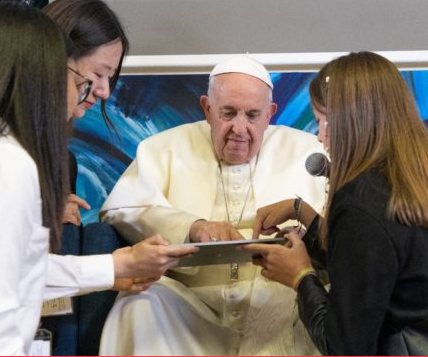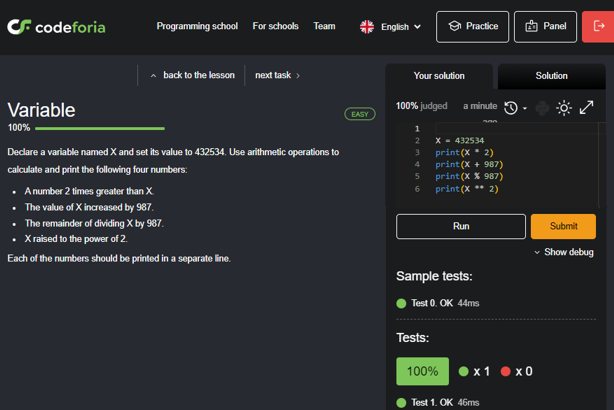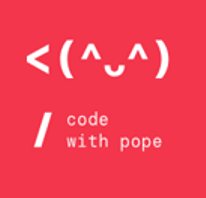| Code With Pope |
| Written by Lucy Black | |||
| Sunday, 29 October 2023 | |||
|
There's a new initiative to teach coding in Python to kids aged 11 to 15. Having been endorsed by Pope Francis, the online program is being promoted as "Code With Pope" to appeal to Catholics across the globe. The online program comprises 15 lessons, each with tasks to complete at three levels of difficulty and has a total of around 16 hours of material. Successful completion earns you a certificate and provides a basic grounding in Python. Available in Spanish, English, Italian and Polish it is intended to reach children in Africa, South America and South East Asia. The course content comes from Codeforia.com, but the idea for branding it as "Code With Pope" is that of Polish millionaire Miron Mironiuk, founder of Cosmose AI, a company whose platform uses AI to predict and influence how people shop offline and claims Estée Lauder, L'Oreal and Gucci among its users. Interviewed by the BBC, Mironiuk explained that, drawing on his own experience of coding transforming his life, he wanted this online program to bridge "the glaring disparities in education" across the globe. Himself a Catholic, will plans to travel to the Vatican to meet Pope Francis saying "I don't expect him to know Python very well, but he will get a certificate for his efforts in helping start the program." It won't be the Pope's first encounter with Python, nor the first time the Pope has encouraged young people to get into coding. In 2019 he was at the launch of the ‘Programming for Peace’ project which aimed to introduce students from disadvantaged communities to computer science and to help use their tech talent for “ethical” purposes. At an event organised by the Scholas Occurrentes foundation in Vatican City, the pontiff was helped write a line of code for a United Nations development app and called on students around the world to learn computer science for world peace. Pope Francis writes his first line of code in 2019 Codeforia.com started its Programming School as an in-person facility in Warsaw in 2015 but later took it online to reach more students in Poland and abroad. It offers courses in Python and C++ at various levels, focusing on teaching algorithmics and logical thinking. Codeforia's staff is made up of former competitive programmers who have the necessary experience and skills to pass on their knowledge and its initial focus was on working with talented students, in particular on preparing them to participate in competitions, including the Informatics Olympiad, Junior Informatics Olympiad, and the Logia competition. Its site explains: Success in these competitions allows our students to choose any high school or university in Poland regardless of the standard recruitment process. They are also helpful when applying to foreign universities. Among the many students we have had the opportunity to work with, over 300 have become finalists or laureates of Olympiads. We take great joy and satisfaction in following their careers. Many of them now work for companies such as Google, Microsoft, and Facebook. The beginner level, the Python course now branded Code with Pope is already online. If you reach it from: https://www.codewithpope.com/#form it requires a parent or guardian to register but from: https://www.codeforia.com/courses you can register with your own email address. As already mentioned the course consists of 15 lessons, each focusing on a different programming language construct and arranged in the recommended order of learning. In subsequent lessons, knowledge from the previous lessons is assumed.so that participants cover the material necessary to master the basics of programming. The course also provides an opportunity to develop algorithmic, testing, and clean code writing skills. The tasks in each lesson are divided into 3 difficulty levels (easy, medium and hard). If you do well with the easy tasks, you can skip some of them and move on to more challenging tasks that are worth more points. The lesson will be considered completed (marked green on the progress bar) if you solve enough tasks. As shown, for each task the description is on the left side and a code editor, where you write your solution is on the right side. After writing your solution, you can run it using the "Run" button or submit it for final evaluation using the "Submit" button. The "Run" button checks your solution's correctness on sample tests but you are not shown the output. Similarly the "Submit" button automatically assesses the correctness of your solution but while you see a message of congratulations you don't get the satisfaction of seeing the output. Learning to program is a very satisfying experience so even though this platform doesn't provide the valuable feedback of seeing the output of the your own code, its well structured approach should succeed in introducing young Catholics around the globe to a new skill that will prepare them for the lucrative careers.
More InformationRelated ArticlesA Crash Course on Python By Google Fly Over the Moon With Microsoft And Python Learn Python with Microsoft or the University of Michigan
To be informed about new articles on I Programmer, sign up for our weekly newsletter, subscribe to the RSS feed and follow us on Twitter, Facebook or Linkedin.
Comments
or email your comment to: comments@i-programmer.info
|
|||
| Last Updated ( Sunday, 29 October 2023 ) |





